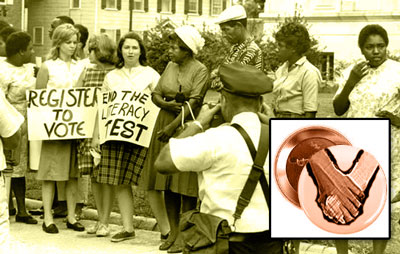Page 1 Page 2 Page 3 Page 4 Page 5

In my Army days a black sergeant told me that if he had a choice between a house in Mississippi and a house in hell, he’d take the house in hell!
In 1964 I had the chance to go to Mississippi as a civil rights worker and see for myself. I wanted to be a missionary and considered this a good opportunity for cross-cultural experience. I was totally unprepared for what I found. It wasn’t just segregated buses and drinking fountains. The whole society was segregated from top to bottom, with blacks getting nothing but leftovers. Hospitals and ambulances were segregated. Even the Red Cross kept separate blood banks for black and white blood. Blacks and whites riding together in the same car were in danger of being stopped and arrested. Ten years after the Supreme Court ruling that segregated schools were unconstitutional, not a single school in the Deep South had been desegregated. The White Citizens’ Council issued buttons with one word: Never. All the good jobs were reserved for whites. Black women worked mostly as maids and black men as farm workers, for fifteen cents an hour. Those that could went north for better jobs and sent their children back to live with aging grandparents living on welfare payments of fifty dollars a month. Average income for blacks in Mississippi was four hundred dollars a year.
Any attempt to change this was met by incredible violence — bombings, shootings, arrests, and beatings. As Stokely Carmichael was fond of saying, “If they ever drained the Tallahatchie River the bodies would come marching out for the next hundred years!”
My introduction to this came at the one-week orientation session in Ohio for a thousand volunteers. My first night at orientation I ate dinner at a table with a group of elderly black ladies from Hattiesburg. They told of being arrested and beaten for trying to register and vote. “Ooie, I thought they was gone kill me. But I’d do it again.” I was assigned to a room with veteran civil rights worker Willie Peacock. He wasn’t very talkative, but I later learned that he had been machine-gunned and still had a slug in his back.
The next morning at the opening session Rita Schwerner got up on stage and told how her husband and two other civil rights workers had gone the day before to investigate a church burning in the red clay pine hills outside of Philadelphia, Mississippi and never returned. She described the frantic calls to police and hospitals, then broke down in tears. She was already convinced they were dead.
Whoa! What was I getting myself into? A few of the volunteers caught the next bus home. The rest of the week was spent in introductions to the leaders of the Freedom Summer, singing freedom songs, and daily classes in teaching literacy and the U.S. Constitution. Mixed in were bomb drills and lessons in how to take a beating. We were issued a detailed list of security precautions: never sit with your back to a window; never go anywhere alone; always sign out with your destination and expected time of return. By the end of the week the fear was palpable.
Go down, Moses,
Way down in Egypt land
Tell old Pharaoh
To let my people go
As our Greyhound bus headed south from orientation, the moon was bright red. Was this an omen? When we finally arrived at our destination of Ruleville, we were unceremoniously dumped on the sidewalk at the edge of town. There was no bus station. We had no idea where we were. Almost immediately a line of white pickups with rifles and big dogs began circling slowly around us. After what seemed like hours, but was probably just a few minutes, some of the black ladies we had met at orientation arrived and led us on foot to meet the families we would be staying with.
Late that night the FBI came calling on the women volunteers, questioning their motives. The guys were invited to a meeting with some students from theUniversityofMississippiwho tried to talk us out of coming. “You don’t understand,” they said. “Everything was fine until outsiders started agitating.” They added that their own lives were endangered by trying to meet with us.
The home I was staying in with the McDonald’s had been shot up the year before, after the occupants had gone down to try to register to vote. Rather than scare them off, Ruleville had become a center of civil rights activities. The blacks there were determined to gain their constitutional rights. Only two percent of blacks were registered to vote, while the overall population was twenty-five percent black. Some counties were seventy-five percent black. The main thrust of the Freedom Summer was a massive voter registration drive accompanied by the formation of the Mississippi Freedom Democratic Party to challenge the all-white regular Mississippi Democratic Party. The Republican Party, the party of Lincoln, was virtually non-existent in the South at the time. Because I had a degree in agricultural education, I was assigned as a Freedom Schoolteacher to teach literacy and government.


Excellent site. Lots of helpful details in this article. My business is sending it to some friends ans additionally revealing around delectable. Of course, thanks for your sebaceous!